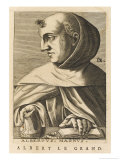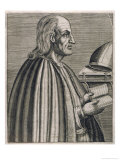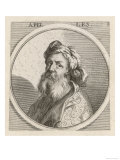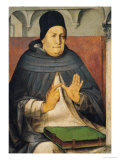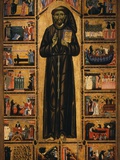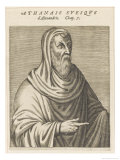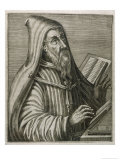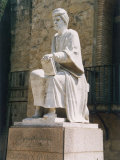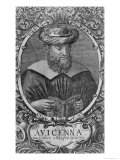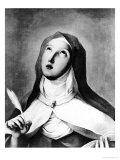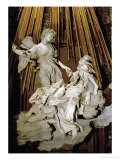|
|
|
Albertus Magnus (Albert the Great)
b. c. 1193; Lauingen, Bavaria
d. 11-15-1280; Cologne, Holy Roman Empire
Albertus Magnus, a Dominican friar, is considered the greatest philosopher and theologian of the Middle Ages. He achieved fame for his comprehensive knowledge of, and advocacy for, the peaceful coexistence of science and religion.
Albertus Magnus quote ~
• “He took over anger to intimidate subordinates, and in time anger took over him.”
|
|
|
|
Saint Anselm
b. c. 1033; Aosta, Kingdom of Burgundy
d. 4-21-1109; Canterbury, England
Saint Anselm, Archbishop of Canterbury, was a scholastic philosopher and medieval theologian famous as seeking to understand Christianity through reason and the “ontological argument” for the existence of God, “that than which nothing greater can be conceived”. He also openly opposed the Crusades.
Scholasticism a tool and method for learning which puts emphasis on dialectical reasoning.
Saint Anselm quotes ~
• “From the moment of her fiat Mary began to carry all of us in her womb.”
• “No one will have any other desire in heaven than what God wills; and the desire of one will be the desire of all; and the desire of all and of each one will also be the desire of God.”
• Anselm of Canterbury: The Major Works
|
|
|
|
Apelles
fl. mid 2nd century
The Roman Apelles was an adherent to the asectic gnostic Marcion of Sinope, one of the most important theologians of the second century, and later the prophetess Philomena.
Marcionism affirmed that Jesus was the saviour sent by God and Paul was his chief apostle; he also declared that many of the teachings of Christ were incompatible with the Yahweh and was the first to separate the sacred texts into Old and New Testaments.
• The Philosophy of the Church Fathers: Faith, Trinity, Incarnation
|
|
|
|
Thomas Aquinas
b. c. 1225; Naples, Italy
d. 3-7-1274; France
Thomas Aquinas was a Dominican priest, philosopher, and the foremost classical proponent of natural theology in the scholastic tradition. Aquina's Summa Theologica is considered second to the Bible in importance to the Catholic Church.
Known as Doctor Angelicus, Doctor Universalis and Doctor Communis, he was the father of the Thomistic school of philosophy and theology which integrated Christian doctrine with elements taken from the philosophy of Aristotle.
Thomas Aquinas quotes ~
• “Reason in man is rather like God in the world.”
• “Charity, by which God and neighbor are loved, is the most perfect friendship.”
• “If... the motion of the earth were circular, it would be violent and contrary to nature, and could not be eternal, since ... nothing violent is eternal .... It follows, therefore, that the earth is not moved with a circular motion. ” Commentaria in libros Aristotelis de caelo et mundo
• “All that I have written seems like straw compared to what has now been revealed to me.”
|
|
|
|
Karen Armstrong
b. 11-14-1944; Worcestershire, England
Karen Armstrong, author of A History of God, is a former Catholic nun.
Karen Armstrong quotes ~
• “Every fundamentalist movement I've studied in Judaism, Christianity and Islam is convinced at some gut, visceral level that secular liberal society wants to wipe out religion.”
• “The one and only test of a valid religious idea, doctrinal statement, spiritual experience, or devotional practice was that it must lead directly to practical compassion.”
• “Fundamentalists are not friends of democracy. And that includes your fundamentalists in the United States.”
• “There are some forms of religion that are bad, just as there's bad cooking or bad art or bad sex, you have bad religion too.”
• “Now I think one of the reasons why religion developed in the way that it did over the centuries was precisely to curb this murderous bent that we have as human beings.”
• “Islam is a religion of success. Unlike Christianity, which has as its main image, in the west at least, a man dying in a devastating, disgraceful, helpless death.”
• “Religion is hard work. Its insights are not self-evident and have to be cultivated in the same way as an appreciation of art, music, or poetry must be developed.”
• “A lot of the arguments about religion going on at the moment spring from a rather inept understanding of religious truth … Our notion changed during the early modern period when we became convinced that the only path to any kind of truth was reason. That works beautifully for science but doesn't work so well for the humanities. Religion is really an art form and a struggle to find value and meaning amid the ghastly tragedy of human life.”
• “True insight does not consist of the acquisition of information but comes from mastering our egotism and greed.” Twelve Steps to a Compassionate Life
|
|
|
|
|
|
|
|
Saint Athanasius
b. c 293 CE; Alexandria, Egypt
d. 5-2-373; Alexandria, Egypt
Athanasius, also known as St. Athanasius the Apostolic, was Patriarch (Pope) of Alexandria and an important 4th century Egyptian leader.
Athanasius appealed for unity among all those who had faith in Christianity, even if they differed on matters of terminology, preparing the basis for the definition of the orthodox doctrine of the Trinity by stressing the distinctions between the persons of God: Christ became human to make human divine.
He was also the first to make the list of 27 books that became known as the New Testament.
Athanasius is a Doctor (L. docere, to teach) of the Roman Catholic Church, honored by the Eastern Orthodox Church, and highly respected in most Protestant doctrines.
• Athanasius (Great Theologians Series)
|
|
|
|
Saint Augustine of Hippo
b. 11-13-354; Tagaste, Algeria
d. 8-28-430; Hippo Regius (Annaba, Algeria)
Augustine, philosopher, theologian, and teacher of rhetoric, was bishop of the North African city of Hippo Regius. One of the most important figures in the development of Western Christianity, Augustine is considered to be one of the church fathers, introducing the concepts of “original sin” and “just war”. He is the patron saint of the Augustinian order.
Augustine was the son of Patricius, a pagan Roman, and Monica, a Christian, probably of Berber origin. Augustine was raised a Christian but took on Manichaeism as a young man.
• “Every city is a living body.” ~ City of God
• St. Augustine Confessions
|
|
|
|
Averroes
b. 1126; Cordoba, Spain
d. 12-10-1198; Marrakesh, Morocco
Averroes, known as Ibn Rushd, was an Andalusian-Arab polymath and master of philosophy (Averroism), theology, Maliki law and jurispudence, astronomy, geography, mathematics, medicine, physics, psychology and science.
Ibn Rushd is considered the founding father of secular thought in Western Europe.
• Islam posters
|
|
|
|
Avicenna (Ibn Sina)
b. c. 980; present day Uzbekistan
d. c. 1037; Iran
Persian Ibn Sina was a the foremost physician of his time and is considered a father of early modern medicine as well as “the most famous scientist of . . . all races, places, and times.”
Known as Avicenna in the West, he was a polymath - learned in astronomy, chemistry, Hafiz (completely memorized the Quran), logic, mathematics, poetry, philosophy, psychology, physics, science, theology, a Sheikh (elder), soldier, and statesman.
Avicenna, writing that children can learn better when taught in classes instead of individual instruction from private tutors, said that competition and emulation among pupils, as well group discussions and debates, were useful.
Avicenna quotes ~
• “The world is divided into men who have wit and no religion and men who have religion and no wit.”
• “Now it is established in the sciences that no knowledge is acquired save through the study of its causes and beginnings, if it has had causes and beginnings; nor completed except by knowledge of its accidents and accompanying essentials.”
|
|
|
|
|
Saint Teresa of Avila
b. 3-28-1515; Gotarrendura, Ávila, Crown of Castile, Spain
d. 10-4-1582; Salamanca, Spain
Teresa of Avila, a Carmelite nun and major figure of the Catholic Reformation, was a mystic, writer and monastic reformer. For two years Teresa experienced Christ as present to her in bodily form, though invisible, and iived with the motto “Lord, either let me suffer or let me die.”
She described the ascent of the soul in four stages -
- heart's devotion,
- devotion of peace,
- devotion of union,
- devotion of ecstasy.
Teresa of Avila, with Catherine of Siena and Thérèse de Lisieux, are the only three women who are Doctors of the Church.
• The Life of Saint Teresa of Avila by Herself
|
|
|
previous page | top | next
theologians list | A | b | c | d-e-f-g | h-i-j-k | l | m-n-o | p-q-r | s | t-u-v | w-x-y-z
|
|
I have searched the web for visual, text, and manipulative curriculum support materials - teaching posters, art prints, maps, charts, calendars, books and educational toys featuring famous people, places and events - to help teachers optimize their valuable time and budget.
Browsing the subject areas at NetPosterWorks.com is a learning experience where educators can plan context rich environments while comparing prices, special discounts, framing options and shipping from educational resources.
Thank you for starting your search for inspirational, motivational, and educational posters and learning materials at NetPosterWorks.com. If you need help please contact us.
|
|
|







